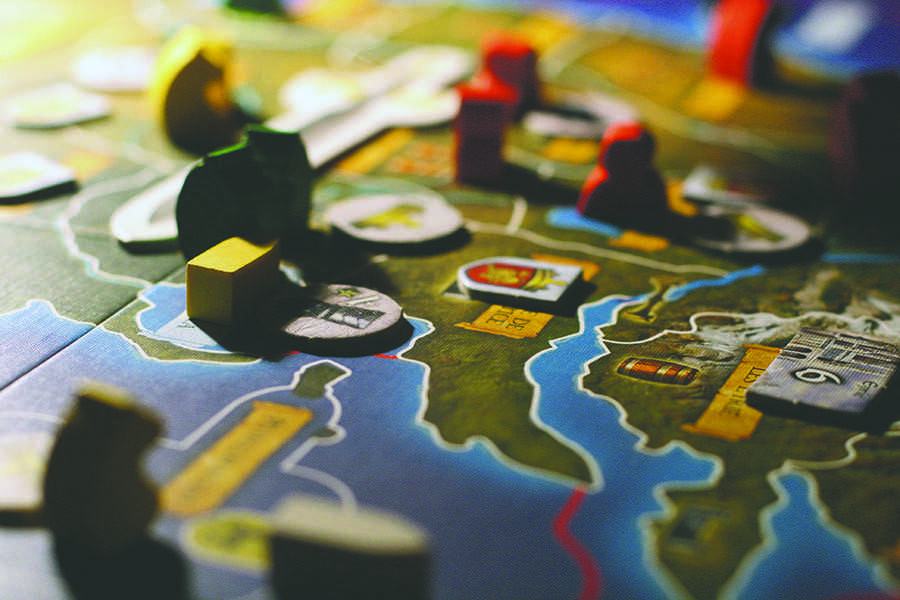Let me lobby for my hobby: Board games
September 21, 2015
I hate the term board games.
First off, it too easily lends itself to the joke “bored games.” It’s a joke made worse by its apt description of far too many of the family games that dominate most people’s perceptions of the genre.
I’m looking at you, “Monopoly.” It may have been funny when my friend took my money at Baltic Avenue the first time, but eight hours later I’d give up all my pink and yellow currency just to put my silver thimble back in the box. My main quibble with the term is its inability to encapsulate the vast array of games and experiences of the genre.
Far too much of my life has been spent believing games like “Clue” or “Risk” were representative of what board games had to offer. It’s not that they aren’t. It’s just that they’re not everything the genre can be.
When I think of board games, I think of the collective mistrust you feel in the last few turns of a game of “Dead of Winter,” suspiciously eying your friends knowing one of them is more than likely about to reveal himself as a traitor.
I think of the moments in “Arkham Horror” when one of your friends makes an impossible roll, and you all celebrate collectively defeating that masochistic game.
I think of the ridiculous accents the table will adopt as they attempt to bribe and silver tongue their way through inspection in a game of “Sheriff of Nottingham.”
The thing that makes board games great is the one thing every one of those experiences had in common: your friends.
It’s what separates a bored game like “Sorry” from a board game like “The Resistance.” One is a fine enough way to spend an hour if you’re stuck inside due to rain. The other is a vessel through which you celebrate you and your friends’ opinions and general mistrust of one another in a fun, safe environment.
When the last person you’d expect, the quiet and awkward one, reveals himself to be a Machiavellian mastermind with a poker face made of stone, that moment will stay with you. It’ll paint a new shade of color into the metaphorical picture that is your friendship. It’ll become a “remember that time when” that you’ll bring up again and again.
This was what I latched onto the first time someone introduced me to games outside of those you’d find in the kid section at Wal-Mart. It was better than watching a movie because my friends and I got to talk to one another while we played. It was better than a video game because we got to look at each other and add facial expressions to the jokes we were telling.
The more games I played, the more I have gravitated toward ones that amplified this trait to eleven and away from ones that do it so poorly they miss the point entirely.
It’s the reason I can’t stand a game like “Cards Against Humanity.” It entertains by providing a safe space to collectively laugh at the misfortunes, prejudices, and atrocities of others while allowing players to deny personal ownership of the statements made by the cards they play. The worst part is players don’t produce the enjoyment of that game.
A better game would be one that uses the same mechanics but empowers its players to create something themeselves.
An example would be “Funemployed,” a game where everyone uses the random traits they are dealt to apply for a randomly drawn job. By adding an avenue for your friends to use the cards as Lego blocks to express their own creativity, it encourages you to enjoy the things your friends say and do rather than the cards the game’s designers created. That’s what a great board game does.
It’s not that I love “Space Alert.” It’s that I love how that game builds an almost telepathic level of cooperation between those of you attempting to survive near impossible odds in real time.
It’s not that I love “Codenames.” It’s that I love that moment when one of your friends perfectly reads the many meanings of your single word clue. I alternately love when your friend misinterprets the clue entirely leading to the argument about “how anyone would possibly think attention was about unicorns” that inevitably occurs afterward.
Playing board games with my friends has left me with amazing memories of them and taught me things about them I may never have otherwise known. When I lift the lid of a board game, I’m not opening a box full of cards, dice and plastic figurines. I’m opening a powerful memory generator that keeps on giving long after the lid is closed, and the box is back on the shelf.
It’s not that I love board games.
It’s that I love my friends.



